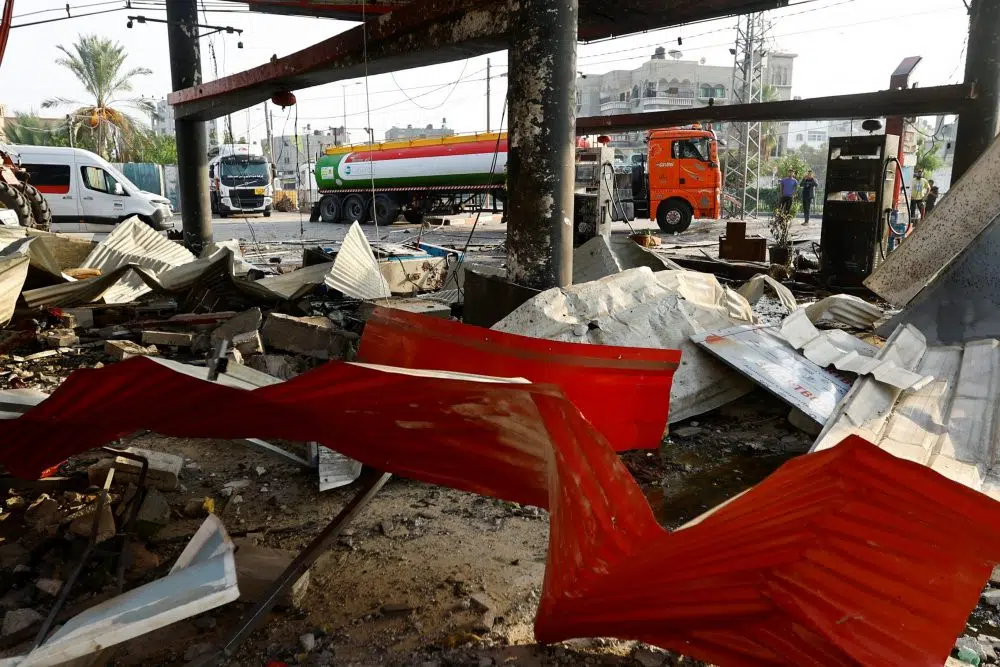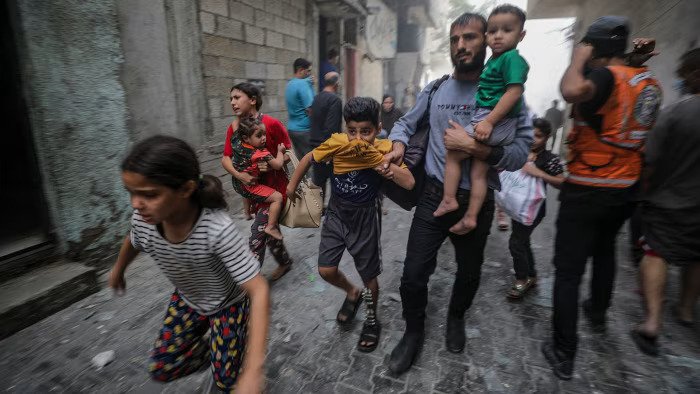World Powers Appeal For ‘Humanitarian Pause’ In The Israel–Hamas To Allow Safe Deliveries Of Aid To Civilians
World powers appeal for ‘Humanitarian Pause’ In The Israel–Hamas to allow safe deliveries of aid to civilians. The United Nations, the United States, and Canada have asked for a humanitarian ceasefire in the Israel-Hamas conflict to ensure the secure delivery of aid to Gaza's civilian population.
Author:Suleman ShahReviewer:Han JuOct 25, 20233.3K Shares371.6K Views

World powers appeal for ‘Humanitarian Pause’ In The Israel–Hamas to allow safe deliveries of aid to civilians.
The United Nations, the United States, and Canada have asked for a humanitarian ceasefire in the Israel-Hamas conflict to ensure the secure delivery of aid to Gaza's civilian population.
Israel's two-week blockade has resulted in the highest 24-hour death toll of over 700 Palestinians due to airstrikes. This escalated international pressure for unfettered relief to Gaza.
“„While we remain opposed to a ceasefire, we think humanitarian pauses linked to the delivery of aid that still allow Israel to conduct military operations to defend itself are worth consideration.- A senior U.S. official
After a meeting of the United Nations Security Council, Jordan's foreign minister, Ayman Safadi, remarked that Israel seemed to be above international law and called for an end to what he called "double standards" in dealing with the Gaza crisis.
Israeel Is Targetting Hamas Hideouts
In response to the devastating cross-border assault on Israel on October 7, the Israeli military has killed scores of Hamas members overnight and destroyed over 400 Hamas sites. However, it will take time to dismantle the Islamist terrorist outfit.
In light of "clear violations of international humanitarian law" in Gaza, U.N. Secretary-General Antonio Guterres has called for the protection of civilians.
In a single day of attacks on Israeli villages close to Gaza, Hamas killed 1,400 people—mostly civilians—and captured over 200 others. U.S. Secretary of State Antony Blinken informed the Security Council that Palestinian citizens were not to blame for the carnage.
Trudeau, the prime minister of Canada, reiterated Blinken's call for a halt in hostilities to focus on humanitarian concerns, saying that such discussions must not stray from the primary goals of safeguarding civilians and rescuing captives.
Request For Humanitarian Ceasefire
The World HealthOrganization has demanded an urgent humanitarian ceasefire in Gaza to prevent a catastrophic shortage of food, medicine, and fuel.
Over 1.4 million Palestinians evacuated their homes for temporary shelters during Israel's heaviest-ever bombing, and doctors in Gaza report that patients arriving at hospitals are displaying signs of sickness due to overcrowding and poor sanitation.
Hospitals are running out of fuel for their electrical generators, limiting their ability to serve patients. Over 40 hospitals have closed.
The United Nations Relief and Works Agency for Palestine Refugees (UNRWA) announced its closure in Gaza due to a shortage of fuel. The Israeli military has reiterated its commitment to restrict gasoline imports to prevent Hamas from taking supplies.
French President Emmanuel Macron expressed his country's "shoulder to shoulder" with Israel in its conflict with Hamas but warned that Israel could not fight "without rules."
Netanyahu promised Israel would protect civilians while ensuring people would no longer live under Hamas tyranny. The Israeli siege has lasted for two weeks, and UN organizations are asking for unrestricted entry of essential supplies into Gaza.
The United States is in talks with Israel, neighboring Egypt, and the United Nations to facilitate emergency supplies into Gaza. According to the Palestinian Ministry of Health, since October 7, Israeli attacks have killed at least 5,791 Palestinians, including 2,360 children.
Humanitarian Pauses
U.N. Secretary-General Antonio Guterres expressed concern over "clear violations of international humanitarian law" in Gaza and called for its civilian population to be safeguarded.
Secretary of State Antony Blinken of the United States has advocated for "humanitarian pauses" to allow for the delivery of critical supplies to the people of Gaza.
Prime Minister Justin Trudeau reiterated Blinken's sentiments, stating that there are many discussions happening today about the necessity for humanitarian pauses and that Canada backs it.
The Israeli-Palestinian conflict is causing tensions between the Israeli military and Palestinians in the occupied West Bank as well as between Israel and the heavily armed Hezbollah militia in Lebanon, which receives funding from Iran.
Global Impact
A larger conflagration might jeopardize the stability of a crucial region for the world's energy supply. Secretary of State Antony Blinken told the United Nations Security Council that the United States does not desire confrontation with Iran but would respond promptly and firmly if Tehran or its proxies attacked U.S. soldiers anywhere in the world.
UN organizations are begging for unrestricted access to Gaza so they may provide critical supplies to the 2.3 million people who reside there.
The United States is in talks with Israel, neighboring Egypt, and the United Nations to smooth emergency supplies into Gaza, but they have disagreed on how the assistance should be inspected and how the bombardments should be handled.
After more than 1.4 million Palestinians evacuated their homes for temporary shelters during Israel's heaviest-ever bombing, doctors in Gaza report that patients arriving at hospitals are displaying indications of sickness caused by overcrowding and poor sanitation.
French President Emmanuel Macron said his country was "shoulder to shoulder" with Israel in its conflict with Hamas, but warned that Israel should not fight "without rules."
Final Words
Due to the formidable military forces of the Middle East facing off against a group with Iran's support and heavy weapons, the likelihood of an Israeli invasion of Gaza is unclear.
Some world governments have encouraged Israel to maintain patience while recognizing its right to self-defense because of their fears that the confrontation may ignite the whole Middle East.
Israel and the Palestinians in the West Bank, as well as Israel and the Hezbollah organization in Lebanon, have been engaged in increasingly violent conflict.
It is Iran's network of proxies in Syria, Iraq, and Yemen that is causing the most concern for a regional escalation that might threaten the world oil supply.

Suleman Shah
Author
Suleman Shah is a researcher and freelance writer. As a researcher, he has worked with MNS University of Agriculture, Multan (Pakistan) and Texas A & M University (USA). He regularly writes science articles and blogs for science news website immersse.com and open access publishers OA Publishing London and Scientific Times. He loves to keep himself updated on scientific developments and convert these developments into everyday language to update the readers about the developments in the scientific era. His primary research focus is Plant sciences, and he contributed to this field by publishing his research in scientific journals and presenting his work at many Conferences.
Shah graduated from the University of Agriculture Faisalabad (Pakistan) and started his professional carrier with Jaffer Agro Services and later with the Agriculture Department of the Government of Pakistan. His research interest compelled and attracted him to proceed with his carrier in Plant sciences research. So, he started his Ph.D. in Soil Science at MNS University of Agriculture Multan (Pakistan). Later, he started working as a visiting scholar with Texas A&M University (USA).
Shah’s experience with big Open Excess publishers like Springers, Frontiers, MDPI, etc., testified to his belief in Open Access as a barrier-removing mechanism between researchers and the readers of their research. Shah believes that Open Access is revolutionizing the publication process and benefitting research in all fields.

Han Ju
Reviewer
Hello! I'm Han Ju, the heart behind World Wide Journals. My life is a unique tapestry woven from the threads of news, spirituality, and science, enriched by melodies from my guitar. Raised amidst tales of the ancient and the arcane, I developed a keen eye for the stories that truly matter. Through my work, I seek to bridge the seen with the unseen, marrying the rigor of science with the depth of spirituality.
Each article at World Wide Journals is a piece of this ongoing quest, blending analysis with personal reflection. Whether exploring quantum frontiers or strumming chords under the stars, my aim is to inspire and provoke thought, inviting you into a world where every discovery is a note in the grand symphony of existence.
Welcome aboard this journey of insight and exploration, where curiosity leads and music guides.
Latest Articles
Popular Articles
